- HOME
- Ecommerce branding
- 10 easy ways to instantly establish trust on your ecommerce site
10 easy ways to instantly establish trust on your ecommerce site
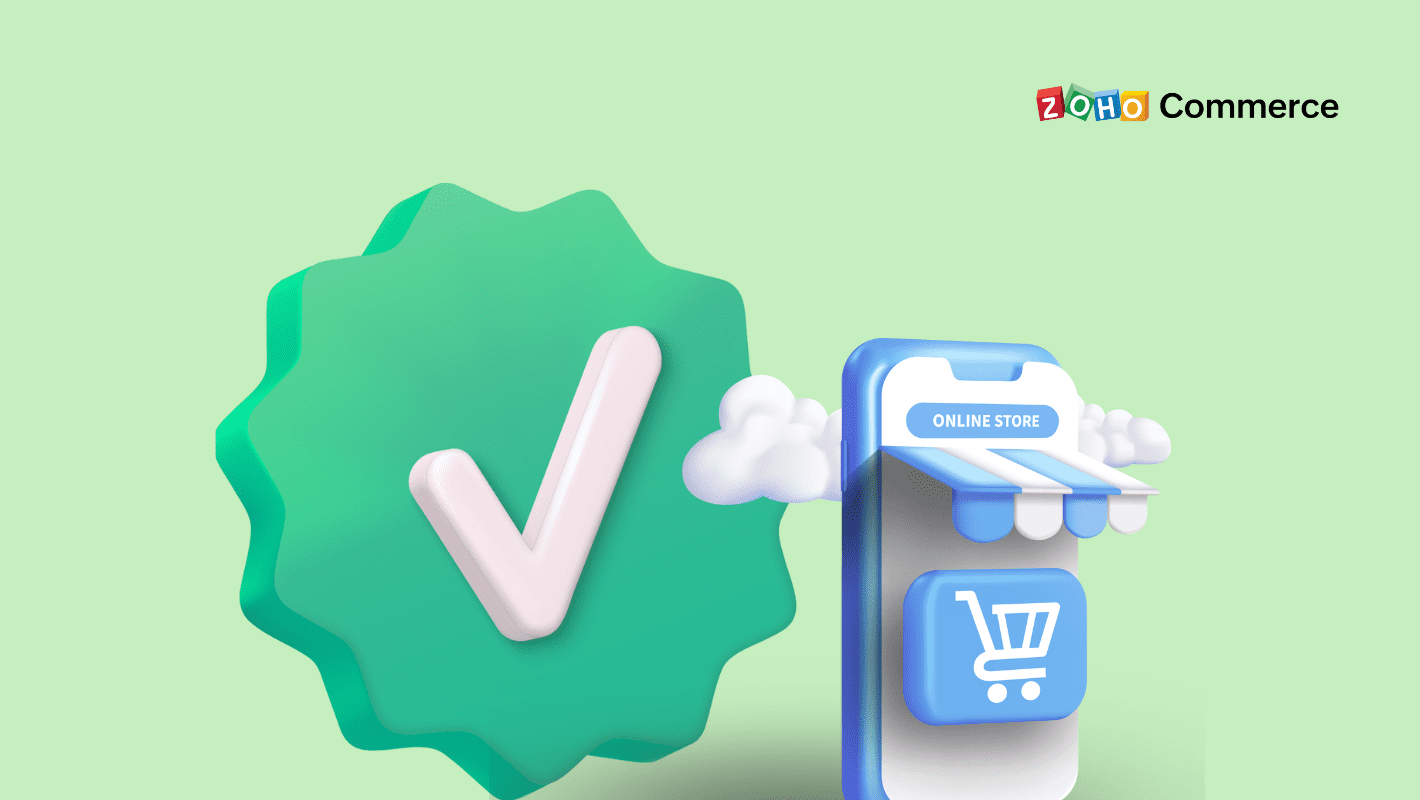
As an ecommerce business, building trust with customers is paramount. Whether you're just starting out or have been in the game for a while, establishing credibility and trustworthiness is essential for any ecommerce business to succeed. Fortunately, building trust with customers doesn’t have to be a difficult process, but there is a lot organizations need to do to build that trust.
In the absence of a face, tangible product or space, trust becomes an important key to the success of an ecommerce business. Customers buy from your website when they feel comfortable with it, but that isn't always a given. For example, the Cisco 2023 Data Privacy Benchmark Study reported 92% of respondents felt organizations need to do more to reassure customers about their data privacy.
Here, we'll discuss 10 easy tactics you can implement right away to ensure your customers understand they are dealing with a legitimate business and their transactions are secure.
1. Build a relationship with your audience
There has never been a better time to be in the business of ecommerce. Even as curating a product mix and building a website is becoming easy, it is important to cultivate lasting relationships with customers who feel they are heard and valued by companies. Consumers need to trust that their data is secure, their orders will be handled correctly, and that they can return or exchange items if necessary.
➤ Disclose all pertinent information about your business including policies, shipping times, and return procedures; customers will feel confident doing business with you because of this transparency.
➤ Create a user-friendly website that offers an easy shopping experience; customers should be able to navigate through the site without confusion or difficulty.
➤ Invest in high-quality images and content on your website. This will help users easily find what they’re looking for, give them a good idea about the product quality, and show them you care about providing quality services.
➤ Reply to comments and messages on social media. Respond promptly to customer queries or host live Q&A sessions where customers can have their questions answered in real time. Getting timely clarifications is highly reassuring for a consumer because they see the business is responsive to their needs.
➤ Offer exclusive discounts or promotions for those who follow you online or subscribe to email newsletters.

By providing these elements on your site, you'll be able to demonstrate trustworthiness and reliability in the eyes of shoppers.
2. Secure your website
Security is essential for any ecommerce business. Securing your website will help reduce or even prevent malicious attacks, data breaches, and cybercrime. This will not only protect customer data but it will also create a safe environment people can trust when shopping online.
Having a secure website is like having a sign of approval which can increase customer confidence, helping them feel comfortable shopping with you. It is a visual indicator that a website is trustworthy and has been verified by a third party.
This verification provides an extra layer of security for consumers and gives them peace of mind when shopping online. Security badges can be found on the home page of a website, typically in the upper-right corner.
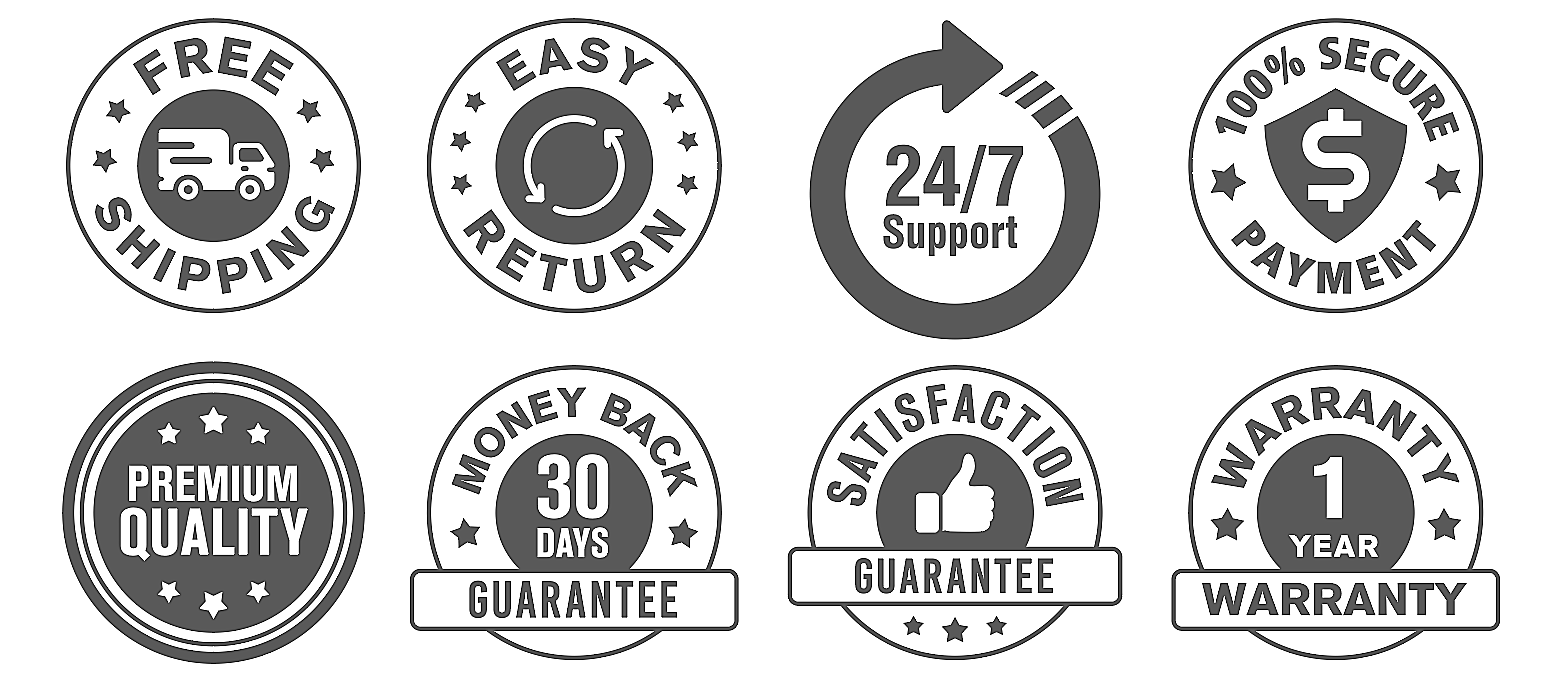
SSL certificates
An SSL (Secure Socket Layer) certificate is a digital file that contains essential data designed to establish trust between browsers and web servers. When installed on a web server, it activates the padlock icon and "https" protocol in the browser bar, signaling the site is secure for exchanging data such as credit card numbers or login credentials.
In other words, having an SSL certificate lets customers know their information will be encrypted and kept safe from malicious third-parties who could otherwise gain access to sensitive data. These visual cues reassure visitors that your site is secure and trustworthy. They can also help reduce the likelihood of customers abandoning their shopping carts due to security fears.
There are a number of different SSL badges and trust seals you can choose from. Some of the most popular include the Norton Secured seal and the McAfee SECURE Trustmark.
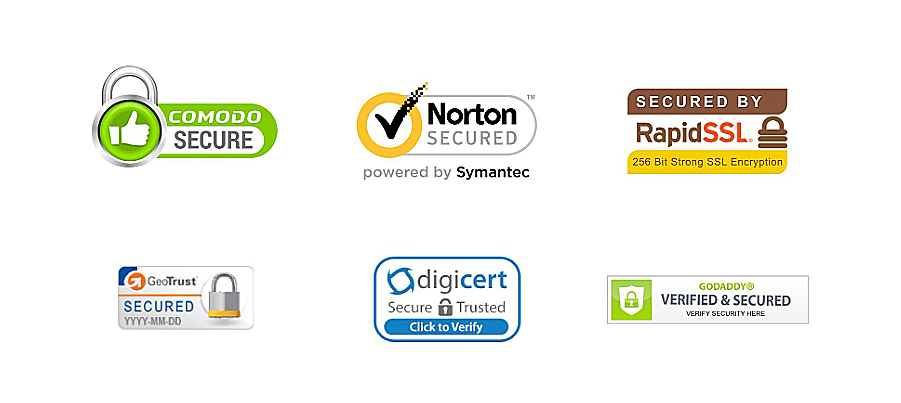
Source: TrustedSite Blog
Payment processor logos
Customers need to feel confident that their personal and financial information is safe and secure when making a purchase. One way to build trust is by placing payment processor logos on your website.
Payment processors are responsible for authorizing and processing payments between buyers and sellers. As a result, it is essential ecommerce businesses select a payment processor that can be trusted with their customers’ data.
By displaying popular payment processor logos like Visa, MasterCard, American Express, or the PayPal logo, you immediately communicate to visitors that not only do you accept these payment methods, but also have gone through the necessary steps to ensure security for these online payments.
All of these payment processors use high levels of security encryption to protect customer data. When customers see these logos on your website, they will know you are a reputable business and their information is safe. This increases customer confidence in your ecommerce store and encourages them to make a purchase knowing their sensitive financial data is safe with you.
Money-back guarantee badges
Money-back guarantees on your ecommerce business site can be an effective way to demonstrate trustworthiness and reliability. By adding a money-back guarantee badge to your website, you can quickly and easily let customers know they won’t be stuck with a purchase if it doesn’t live up to their expectations.
This type of assurance will help build trust in your brand and establish credibility among potential customers. It could even be the difference between making a sale or losing one due to customer hesitation or uncertainty about purchasing from an unfamiliar site.
Return policies are one of the most helpful ways businesses can show customers they care about their satisfaction with their purchase. Customers feel more comfortable knowing they’re not stuck with something they don’t like or need. A good return policy should be clearly visible on your website so potential customers can easily find it and understand the rules before buying any items from your store. Put simply, a clear return policy can help turn potential buyers into loyal customers.
Third-party endorsements like a Better Business Bureau badge
Third-party endorsements are important because they are proof your ecommerce website has been vetted and found to be trustworthy by meeting certain standards of quality and customer service. The Better Business Bureau (BBB) is a non-profit organization that has been providing consumers and businesses with unbiased information about companies since 1912. They accredit businesses who meet their standards of trustworthiness, including maintaining honest advertising practices, responding quickly and positively to customer concerns, and honoring commitments.
By displaying their seal on your website, you can quickly let visitors know you have been certified by this trusted organization and your customer service practices are up to standards. With just one click, shoppers will instantly be reassured that they’re dealing with a reputable ecommerce business who takes their satisfaction seriously.
3. Display social proof
It’s hard for customers to invest in an online store they know nothing about. That's why displaying social proof on your site is one of the most effective ways to establish trust quickly and successfully.
Creating an environment where customers feel confident in their buying decision should be top priority for any ecommerce business. Leveraging social proof is an easy and effective way to achieve this goal quickly.
Social proof can include reviews, ratings, and photos or videos from satisfied customers. This evidence gives potential customers the reassurance they need to feel more confident in their purchase decision and helps build a positive reputation for your business.

Social proof is any type of evidence that suggests people are already engaging with or have had a good experience with your product or service. Showcasing real stories from past customers will help demonstrate you are reliable and trustworthy, while also making visitors feel more connected with your brand.
By displaying this information prominently on your site, you can instantly show visitors they can trust you and your business often before they even make a purchase!
4. Offer 24/7 customer service
Providing around-the-clock support can make people feel more confident in their decision to buy from you, as they know there is always someone available to answer questions and address any problems that may arise. With features like live chat; AI-driven automated messages; proactive chat triggers; and analytics reporting tools, using Zoho SalesIQ, your team can stay connected with visitors without compromising privacy or security. More so, you get access to detailed reports that show you which pages are viewed most often by visitors and how they interact with them. These insights will help you better optimize your website for maximum engagement from customers.
By allowing customers access to support whenever they need it, you are creating an environment of trust for them. They will appreciate that you value their time and are willing to help resolve issues at any hour of the day or night.
This will help create an open dialogue between your company and its customers — something all successful ecommerce businesses should strive for.
5. Utilize reviews and testimonials
User reviews are incredibly valuable as they provide potential customers with an unbiased look at the experience others had with your business. Testimonials allow you to showcase customer stories that can help build a sense of credibility for your ecommerce site.
Both user reviews and testimonials can be used on product pages or other areas of the website to quickly draw attention to why people should shop with your business.
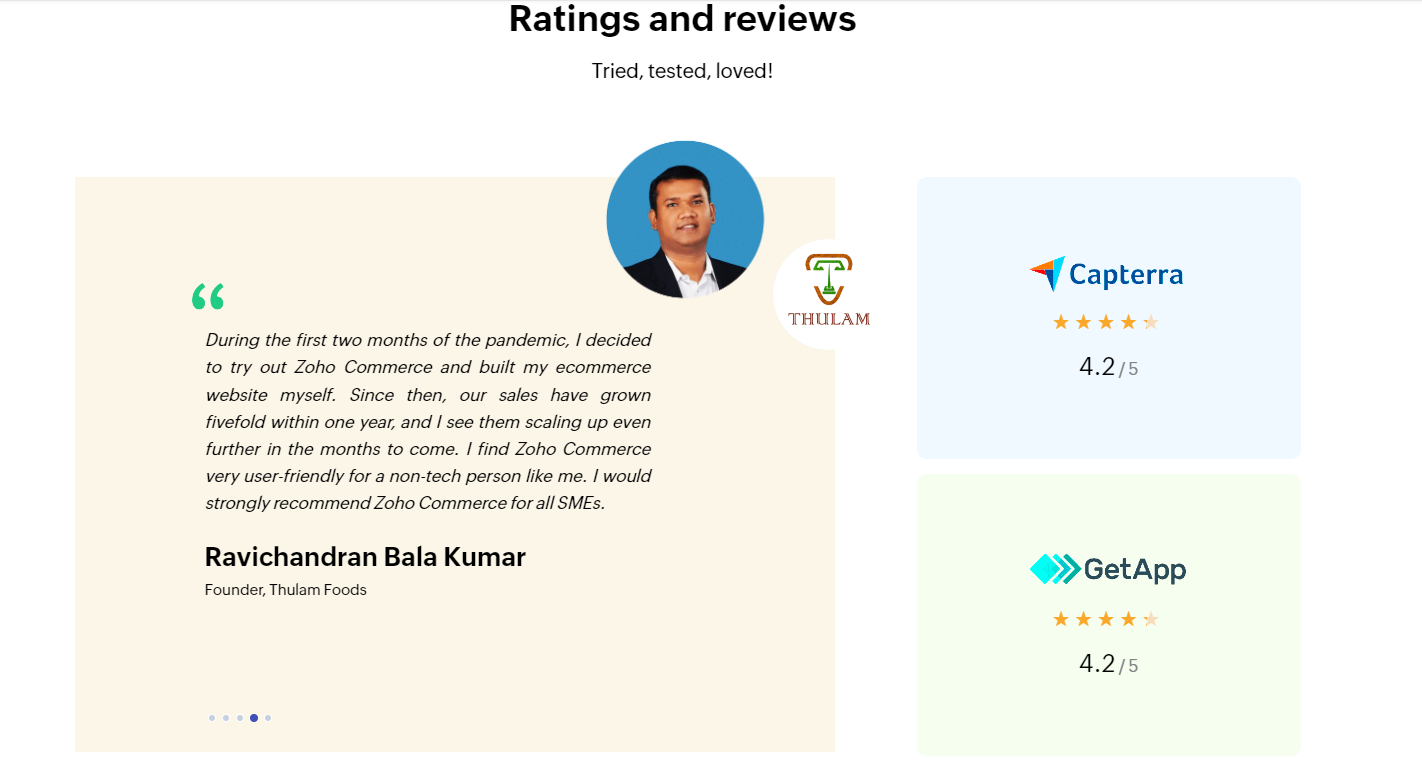
User reviews also provide valuable insights into what customers think of your company and how satisfied they are with their purchase. By incorporating these comments into your site, you can promote an honest dialogue with customers while assuring them that their opinion matters to you.
Similarly, you can add one section on achievements and awards, as well as one for media coverage. In the screenshot of Citygreens's website below, you can see an example of this. Both these subsections can help foster trust.

6. Detailed product related displays
It's crucial to provide details about the products you're selling and give prospective customers assurance. Filling in product description fields and adding high-quality images of the item can help boost consumer confidence.
Other helpful information could include technical specifications, applicable warranty policies, wash/use care instructions, and similar facts. Offering detailed information will not only build customer loyalty but also encourage them to make a purchase from your website.
Here are some points that you must definitely include in your website's information:
Product information:
Include detailed product descriptions and clear images that let shoppers know exactly what they are getting. For example, if you're selling a sofa, don’t just say it has a soft fabric cover; be specific about the fabric type and color. If buyers have any questions about sizing or other features, provide answers below the product description.
Creating a product page that includes images, descriptions, sizes, and pricing allows customers to gain a clear understanding of what they are purchasing. Additionally, including customer reviews or ratings for each product can also be beneficial in showing potential buyers what others have experienced with said product.

Source: Amazon
Shipping policy:
Whether you offer free or paid shipping, express or standard delivery times, listing this information on your website will help build trust with potential customers. They will know exactly what to expect in terms of time frames for their order and won’t be overcharged for shipping costs that may not have been made clear before checkout. This will give them a sense of security and ensure they feel comfortable purchasing from your store.
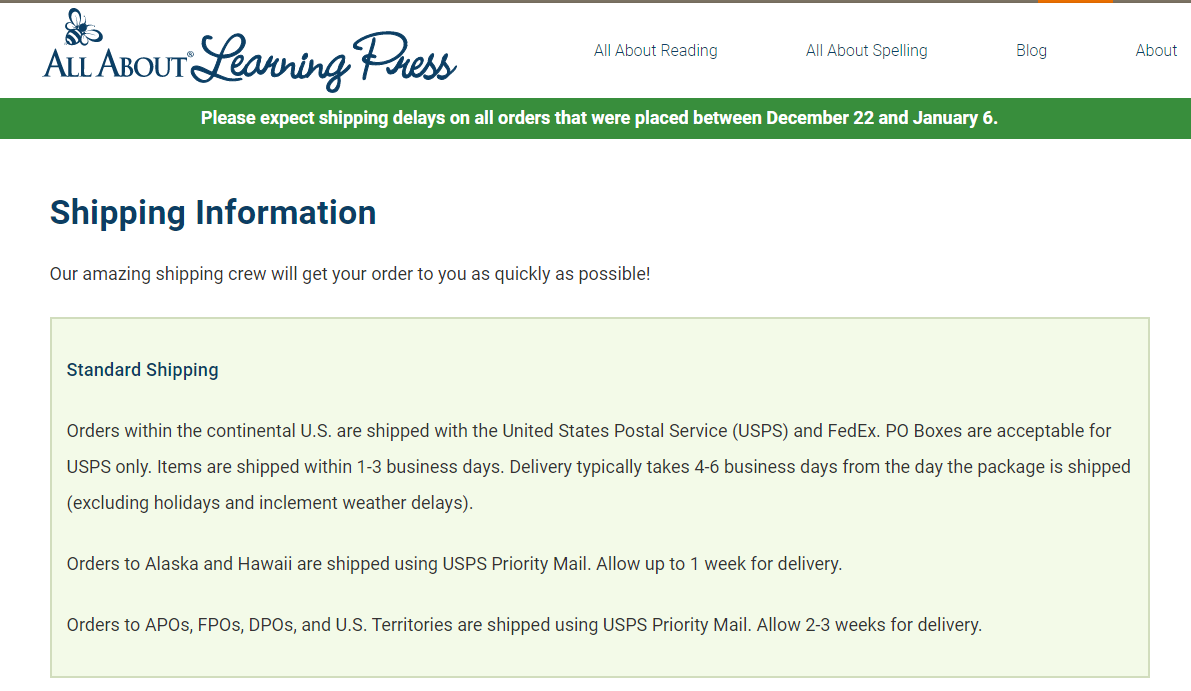
Source: All About Learning Press
Return policy:
Return policies are meant to protect both customers and businesses from any dissatisfaction with a product or service. For example, if a customer purchases something online that isn't what they were expecting, providing a clear return policy gives them the reassurance of knowing their money won't be wasted.
Creating an effective return policy for your ecommerce business will instantly establish trust with customers who visit your website. When crafting your policy, make sure you explain the types of returns you accept, how long customers have to make their return, what type of condition the item needs to be in, and any other relevant details so customers can understand exactly what they’re getting into when they shop at your store. Not only will this give them peace of mind, but it will also increase the chance that they’ll stick around as loyal repeat customers.
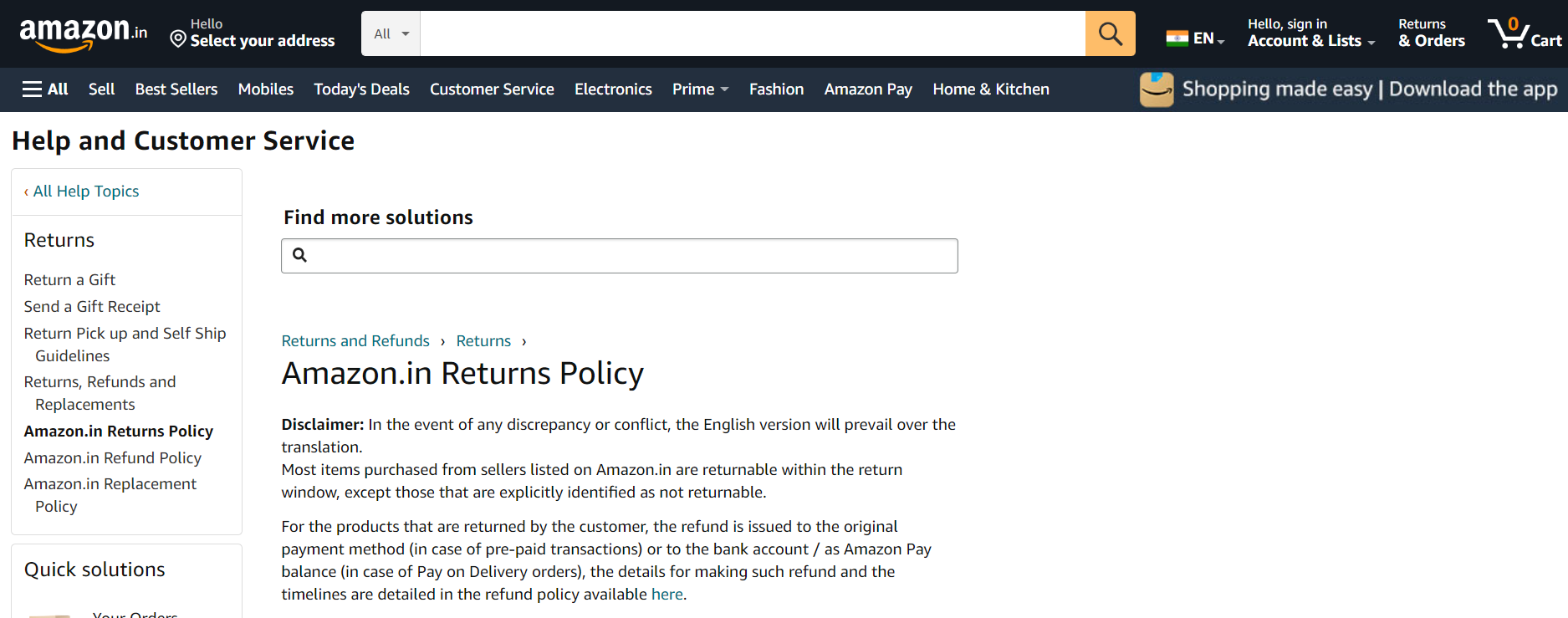
Source: Amazon
FAQs:
An FAQ page provides answers to basic questions customers may have before they make their purchase. By providing this information upfront, you can reduce customer anxiety and increase the likelihood of them buying from you.
A good FAQs page provides comprehensive coverage of topics like delivery times, return policies, customer service inquiries, product specifications, and similar broad topics. Make sure all information is accurate, up to date, and easy to find. The page should be clearly presented on the website so customers don’t have to search too hard for it.
Here are some tips on how to get started:
➤ Include questions relevant to your products or services.
➤ Provide clear, concise answers.
➤ Use visuals like images or videos where appropriate.
➤ Offer links for further reading on specific topics.
➤ Make sure the design of your page reflects the professionalism of your brand — it should look modern and inviting.
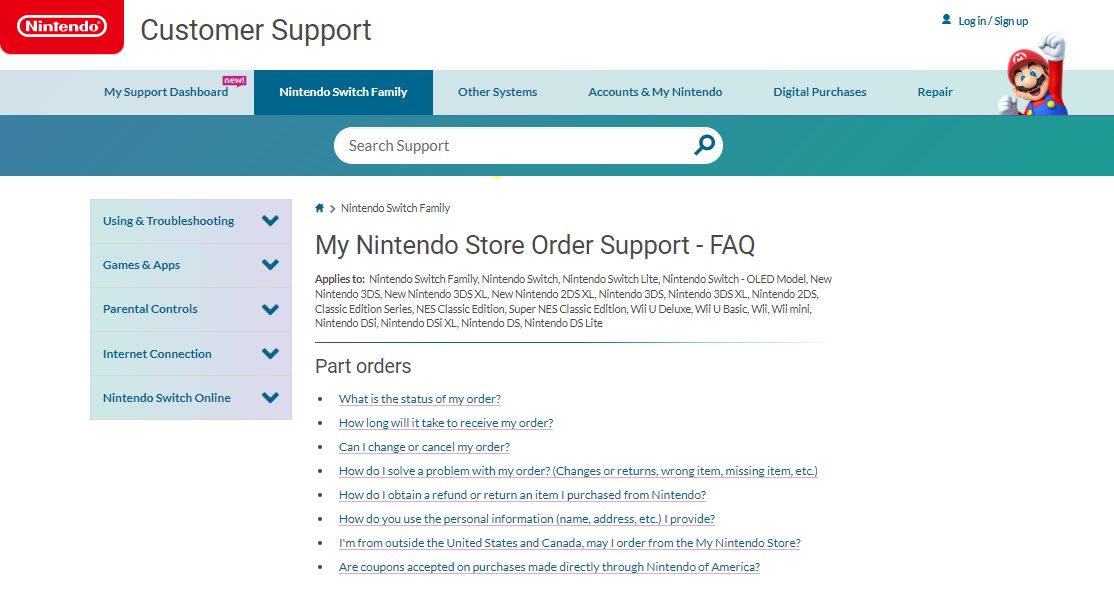
Source: Nintendo Switch
Terms and conditions:
Your terms and conditions page serves as a legal agreement between you and your customers that protects both parties in case any disputes or issues may arise during the transaction process.
The terms and conditions page should be written in plain language that is easy for customers to understand and provides them with all the information they need about doing business with you. It should cover everything from payment methods, delivery timescales, policies, data privacy laws, copyright information, and more so customers know exactly what they're getting into when buying products or services from your website.
It should also specify any restrictions or limitations on the use of products or services. By having clear terms and conditions available on your website, you can ensure customers will have full confidence when making purchases from your store.
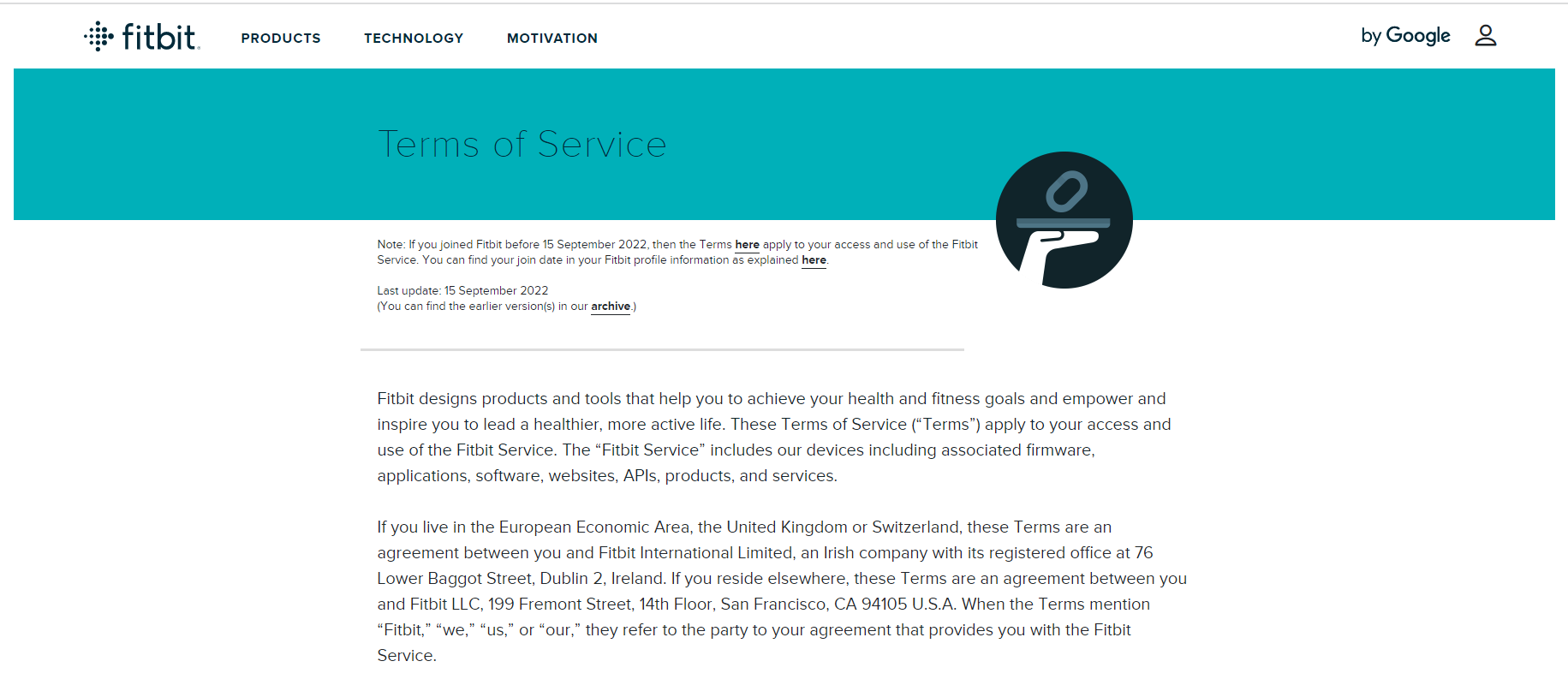
Source: Fitbit
Contact information:
An up-to-date contact information page on your website gives potential buyers assurance they can reach out whenever needed. Customers are more likely to purchase from a website whose contact details are provided than one without.
Furthermore, it can help build long-term relationships with those who have already purchased items from you by providing them the means to get in touch quickly if needed.
Creating a prominent and straightforward contact information page is essential for any ecommerce business looking to build trust amongst its customers. The page should include a phone number, email address, and physical address of the business so customers can choose how they'd like to communicate with you. You may even want to list the hours of operation so customers are aware of when assistance is available.
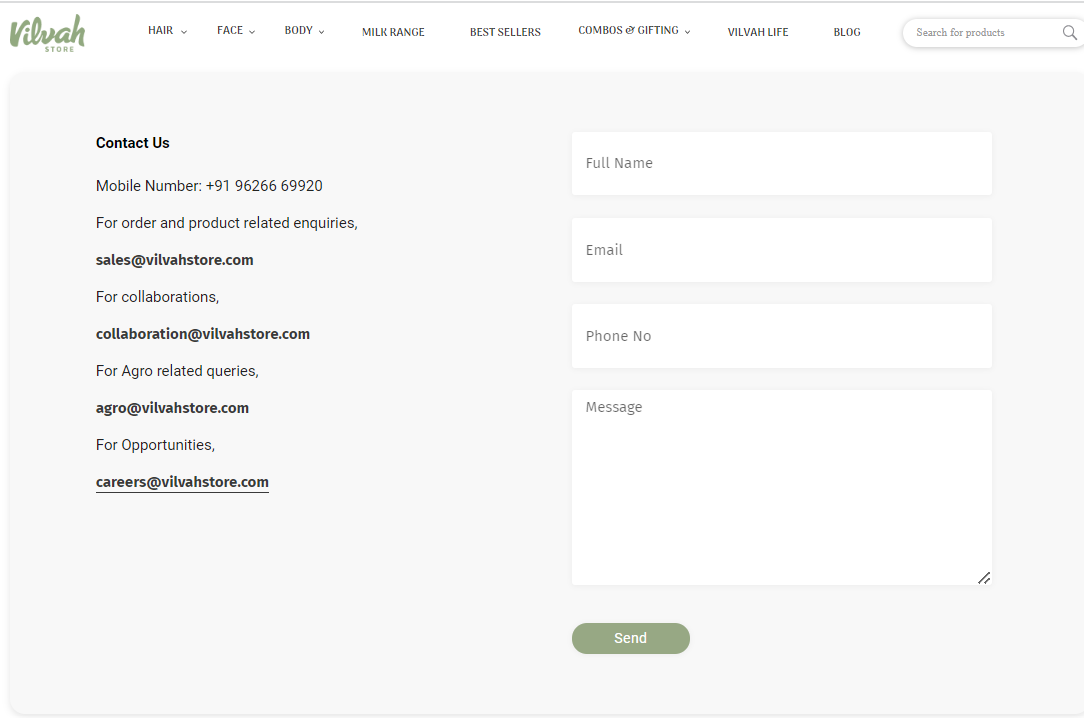
Source: Vilvah
About us page:
An "About Us" page should provide information that helps customers get to know the people behind the business, understand the reasons why you do what you do, and ultimately build trust in the company.
It should highlight any awards or accolades you have received for your ecommerce business. It should also contain information on how long your business has been running, as well as a brief overview of what services or products you offer.
This demonstrates that your company is experienced in its field which can encourage customers to make purchases from your store with greater confidence. By providing background information on the company, its mission, and its leadership, customers can gain insights into the values and reliability of the brand they are buying from.
Furthermore, when companies provide bios of their team members along with professional head shots, it further establishes credibility with potential customers.

Source: Okhai
7. Brand consistency
Brand consistency applies in all aspects of your ecommerce operation, from website design to product packaging. From the moment a customer visits your site, they should be able to recognize your company's branding elements as consistent throughout, including fonts, colors, logos, and style guides. Establishing a unified look and feel across all of your customer touchpoints will let customers know they can count on you for a quality product or service.
This ensures every interaction they have with your business reflects the values and quality standards you value. Furthermore, consistent branding across all channels - from the website itself to social media accounts - reinforces the message that your business can be relied upon for quality service and satisfaction.
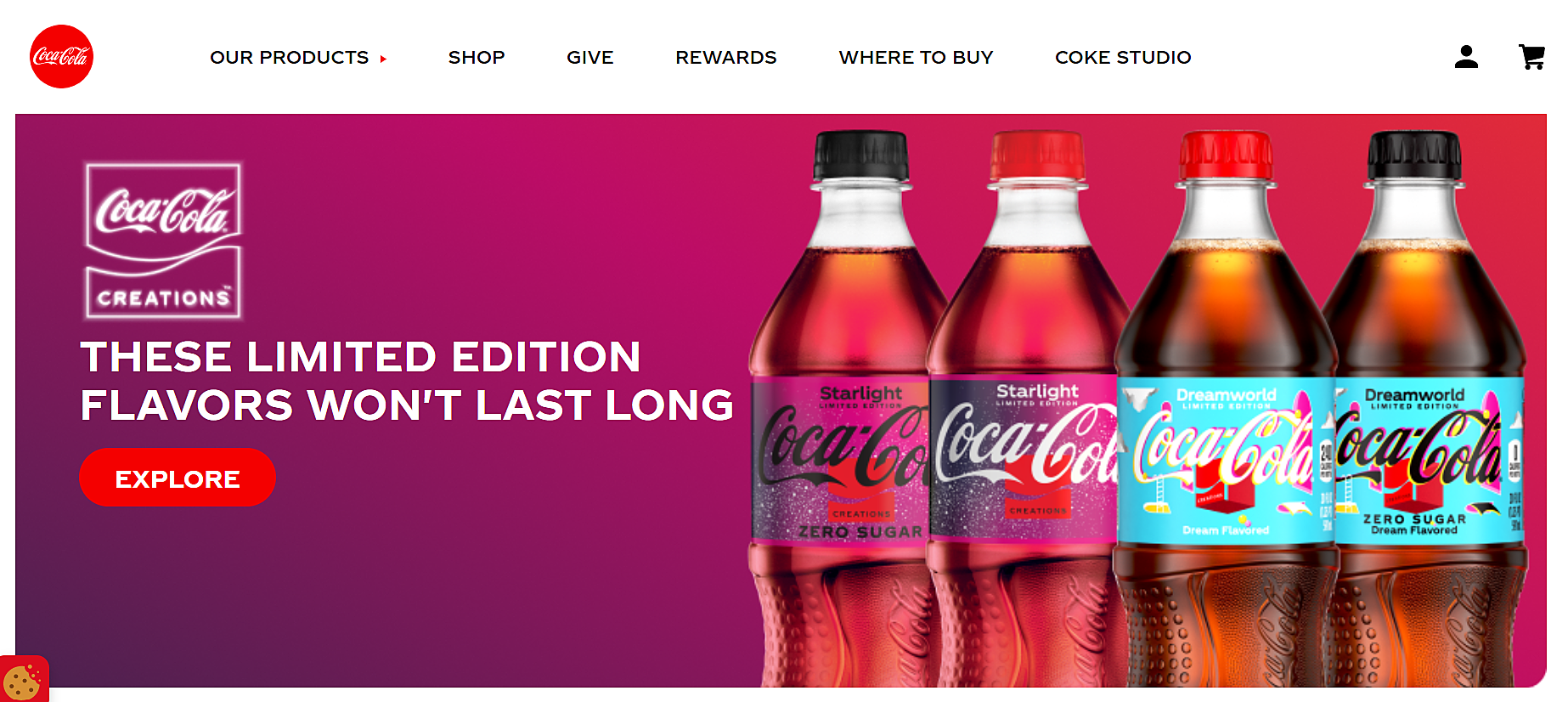
Source: CocaCola
8. Foster customer engagement
At the heart of successful customer engagement is creating a personalized experience for each user. This could include personalizing emails, providing tailored recommendations, and sending exclusive offers not available elsewhere. Additionally, businesses should be engaging with customers through social media platforms and actively responding to any queries or complaints made as quickly as possible.
Along with catering to existing customers, businesses also need to focus on attracting new ones by optimizing their content marketing strategy, ensuring users are aware of news or updates from the business itself via blog posts or newsletters.
Customer engagement offers an opportunity for businesses to interact directly with their customers, creating a sense of connection and familiarity that builds trust. A solid customer engagement strategy helps businesses create relationships that go beyond mere transactions, allowing them to offer personalized experiences, tailored recommendations, and unique incentives that make the customer feel special.
9. Utilize secure shopping carts
Secure shopping carts provide an extra layer of protection for both business owners and customers alike. They encrypt customer data and keep it safe from potential hackers or scammers who might try to steal information or money through online transactions.
Plus, having a secure checkout process also builds credibility with your customers. They’ll know their sensitive data is being handled responsibly and will have faith in your ability as an ecommerce business owner to protect them while they shop on your site.
By investing in a secure online shopping cart solution for your ecommerce business, you can create a reliable buying experience for all your customers. Customers will appreciate the security measures you have taken to protect their data, which will lead to more sales and greater customer loyalty.
Secure shopping carts also help protect businesses from fraudulent activity by verifying a customer's identity before transactions are approved to prevent any suspicious activity.
10. Ensure site performance
A website that loads slowly or doesn’t function correctly can create negative feelings in customers, potentially leading to lost sales and decreased customer confidence. When customers are shopping online, they expect websites to load quickly and run smoothly without any errors or lags.
Slow loading times can cause customers to lose interest in the product they’re looking at or even abandon their carts altogether. This can have a huge impact on an ecommerce business's bottom line.
High-performance websites help create a sense of reliability for shoppers, making them more likely to come back in the future and build trust with that brand. It encourages customers to shop around and make purchases quickly while feeling secure with their decision. Improving site speed also helps increase page views, as customers are more likely to stay longer if they don’t have to wait for pages to load.
Conclusion: Increase customer confidence
In short, trust is important for any ecommerce website. By taking advantage of the 10 tips outlined in this article, you can create a trustworthy environment that will make your customers feel secure and excited to purchase products from your website.
From using easy-to-read privacy policies to providing clear return and exchange information, there are many things you can do to build trust with your customers. As a result, you'll be able to create loyal customers who will continue to shop with you for years to come.
It's time to get started on your journey building trust with customers and have a successful online business!
